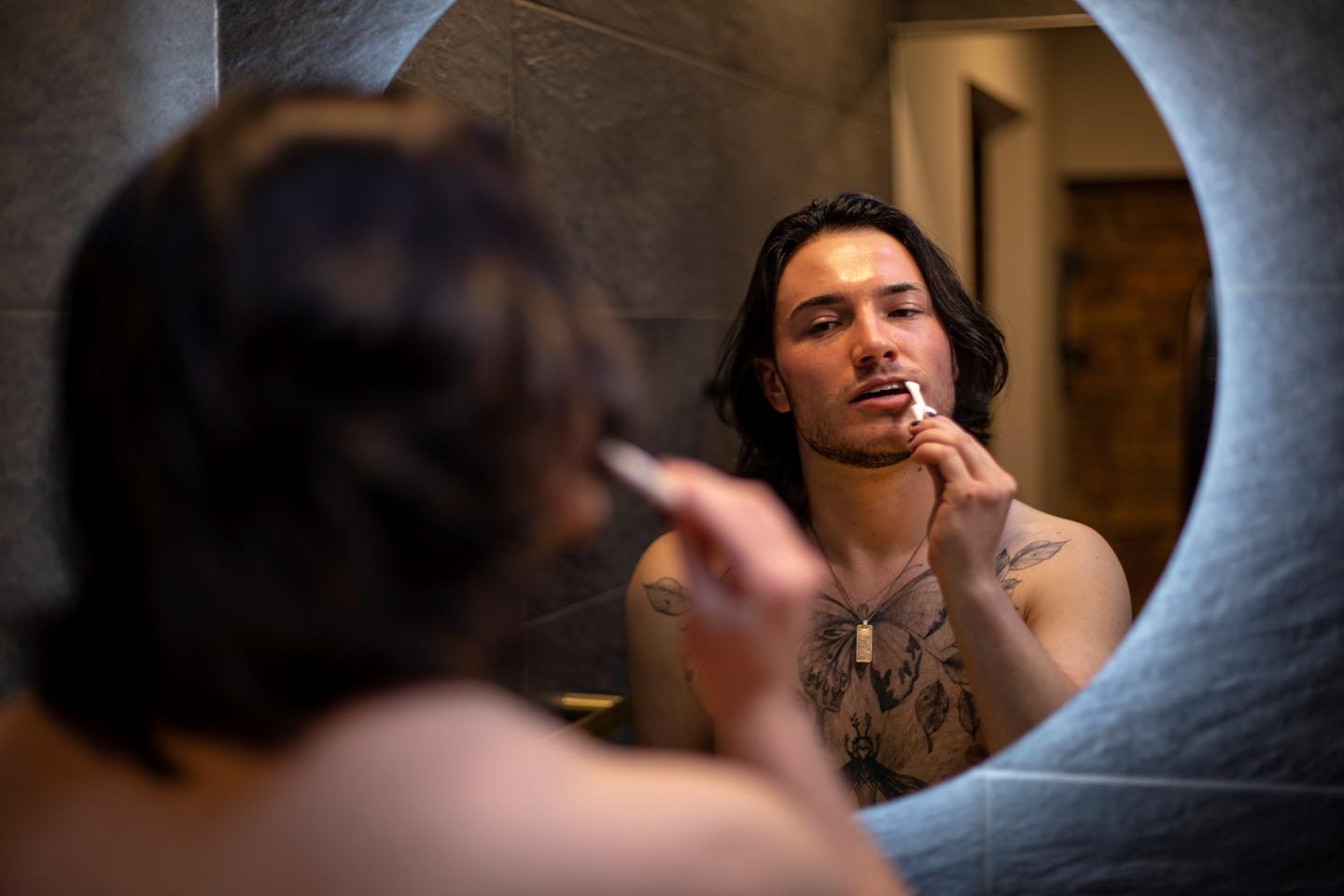Insider’s guide to opening up your relationship safely
So, you want to open up your relationship. Awesome!
Open relationships are a really valid option for many couples. But they also require a lot of work to ensure they’re negotiated safely and respectfully. Sometimes, you might find they don’t always work out, and that’s ok.
Here’s our top 7 tips for getting into and maintaining an open relationship of your own.


1. Communication is key
Unless you’ve been living under a rock, you’ll have heard this before. But it’s so critical for open relationships that it’s worth reiterating.
The number one relationship killer is a breakdown in communication.
Communicating in a relationship with just one other person is a lot of work, so when you add other people into the mix, you need to put in extra effort to make sure everyone stays on the same page.
The level of communication required in open relationships can initially feel exhausting and can naturally open up really difficult conversations. There will be times when this feels almost impossible. But hang in there! You’ll get used to it, and the communication and conflict resolution skills you develop along the way will hold you in great stead in other areas of your life.
The number one relationship killer is a breakdown in communication.
2. Get clear on what you want before you start the conversation
To be clear, the decision to open up your relationship should be made together. However, if you’re the one wanting to initiate the conversation, it might pay to first be clear on what you would like, provided you’re willing to compromise based on how the conversation goes.
Here’s a few questions you could ask yourself - they’re also great questions for your partner to consider, to ensure you’re on the same page:
- How open would I want to be? There are lots of different types of open relationships (you can read more about them here)
- What would I be comfortable doing with other sexual and/or romantic partners?
- What would I be comfortable with my partner doing with other sexual and/or romantic partners?
- Are you open to playing together, separately, or both?
- Are there any rules you think would be worthwhile discussing i.e. only using condoms as a prevention method with others, or no hosting?
- How and where would you be comfortable meeting other partners?
- Are you comfortable with other people finding out? Using or sending images in apps like Grindr, or hooking up with others at a club, could inadvertently ‘out’ you to friends or whānau, so this is something to bear in mind.
You don’t have to have all the answers at the beginning but thinking about these things will help you set and refine boundaries as your relationships progress.


3. Keep things safe
Monitoring your sexual health is super important in open relationships, as having unprotected sex with others puts you and your partners at risk.
Luckily, you have plenty of options to stay safe – and you can use more than one if you’d like!
- Condoms and lube: Wearing a condom (with lube) is still the best protection against HIV and all other STIs;
- Get tested regularly: Most STIs have window periods which can range from 2 weeks to 3 months, so make sure you’re in the habit of testing regularly;
- U=U: Getting tested means you know your HIV status! Remember, if you or a partner is living with HIV and has an undetectable viral load, you can’t pass HIV on.
- PrEP: PrEP is a daily pill that stops you from acquiring HIV. If you’re eligible, being on PrEP is also a great way to ensure you’re tested at 3-month intervals. If you’ve not been on PrEP before, find out if you’re eligible for an online consultation.
- PEP: When taken within 72 hours of exposure, PEP is a treatment that eliminates the risk of you acquiring HIV after a potential exposure. If you think you may have been exposed, we have a free online tool which can help you determine the level of risk.
Remember, PrEP, PEP and U=U are both great ways to protect yourself or your partners from HIV but won’t protect you from any other STIs. So, if you're using one of these HIV preventions strategies but not condoms, it's even more important to be getting regular STI screenings.
A lot of STIs don't have symptoms, so simply looking at your penis or butthole often isn’t enough to tell if you've acquired something. Getting a full STI screen keeps you healthy, as well as helping to prevent anything passing on to any of your partners.
Why is HIV testing important in an open relationship?
Find out hereDiscuss how much each partner(s) would like to know, and have a consistent approach with each partner you have (even if it’s a different approach with different partners).
04. Consider how much you want to know
A lot of people who get into open relationships start off with a ‘don’t ask don’t tell’ approach, which basically means each person in the relationship is in control of how much information is shared with them regarding their partner’s/ partners’ encounters with others.
This approach can work, so if that’s what you’d like to do, all power to you! However, not knowing what’s going on can be an issue. And some people really want share things with their partner(s), which can be challenging if that desire isn’t reciprocated.
The best advice here is to discuss what each partner(s) would like to do and have a consistent approach with each partner you have (even if it’s a different approach with different partners). For example, if your primary partner prefers a ‘tell me everything’ approach and you’re comfortable doing so, make sure to do that every time. But if you have a secondary partner who prefers a ‘don’t ask don’t tell’ approach, make sure to also respect that when you’re engaging with them.
Generally speaking, knowledge is power – the more you know, the more control you can have over your emotions and how you respond to them. But this approach isn’t for everyone, so you need to know where you stand on this issue.


05. Try a non-judgmental approach to jealousy
Most people who practice non-monogamy will tell you that, while being in an open relationship can help you deal with jealousy, it’s rare for jealousy to never be an issue. Jealousy is part of the human condition and hoping for it to disappear forever is probably unrealistic.
This doesn’t mean that jealous feelings are always a sign that something is wrong, or not working. When you feel jealousy, it’s important to ask yourself why you’re feeling that way. Often, jealousy has more to do about how you think about yourself, rather than what is happening externally. For example, if you’re a gay guy in an open relationship, you may feel jealous when your partner sleeps with someone you consider attractive – which could be more about your own self esteem than anything else.
Rather than judging your jealousy, try to think it of it objectively. Doing so will help you determine whether it’s an issue that needs to be discussed with a partner(s), or if it’s something for you to process on your own.
Compersion
If you want to be in an open relationship but struggle with jealousy, it's important to understand compersion. Compersion is the opposite of jealousy and is most simply described as "the feeling of being happy for someone having an experience they enjoy". Lots of books and online resources about polyamory discuss compersion and give some great advice about how to be comfortable with your partner being with others.
When you feel jealousy, it’s important to ask yourself why you’re feeling that way.
06. Be respectful
Sure, it may be fun to sleep with four or five new people every week, but when you’re in an existing relationship those new dates can account for a lot of time (and potentially money) spent away from your existing partner or partners. Be fair to them and keep your ego in check.
If you’re worried about how much time you spend with others, talk about it with your partner(s). Likewise, if you’re in a relationship with someone who you feel is neglecting you, make sure you communicate with them about it.


07. Be open to change
We are constantly evolving as individuals, and our relationships are evolving along with us. Being in the mindset to open up your relationship at one point in time doesn’t necessarily mean you’re always going to feel that way. And you may not always feel like sticking with the same form of non-monogamy forever.
It can be useful to have an ongoing conversation with your partner(s) about what their expectations or desires are for the future, specifically in relation to your non-monogamy, as this may change over time. For example:
- Some open couples may decide to move to polyamory (including romantic connections)
- Others may want to slow things down and become monogamish (where sleeping with others is still a possibility, but not the norm and perhaps in certain circumstances)
- Polyamorous couples may decide to push things even further into relationship anarchy (where all semblances of a monogamous lifestyle, like living together or sharing bank accounts, may be thrown out the window)
It may also be useful to plan for breaks in your non-monogamy, especially if you’re new to it. Sometimes open relationships get overwhelming, so this can provide a useful safety net and gives you a chance to talk out these anxieties in a safe and comfortable space.
Like with everything related to consensual non-monogamy, there are no universal rules. You get to decide for yourselves how you would like to manage your own relationship on your terms.
It may be useful to plan for breaks in your non-monogamy, especially if you’re new to it.
At the end of the day
If you approach consensual non-monogamy at a responsible pace, with an open heart and an excited spirit, you can have amazing connections with people, lots of love in your life and, well, the sex can be pretty awesome too.
If you’re looking to open up your love life, get thinking about the type of openness you’d like to have, how to start that first conversation with your partner, and remember to put measures in place to safe while you’re at it.


